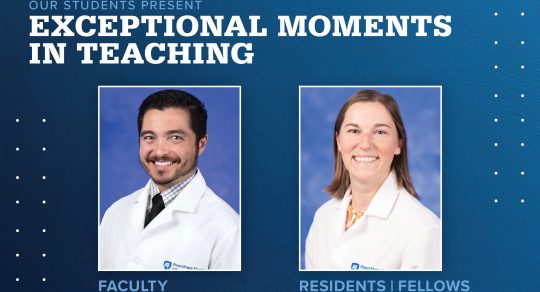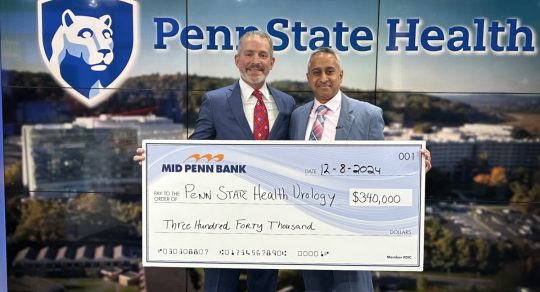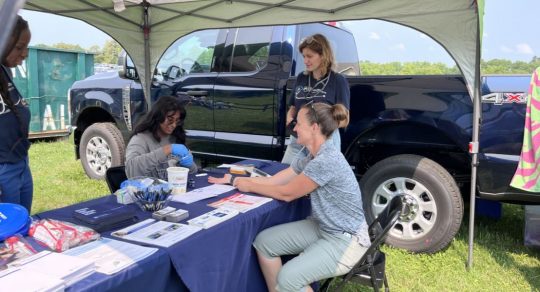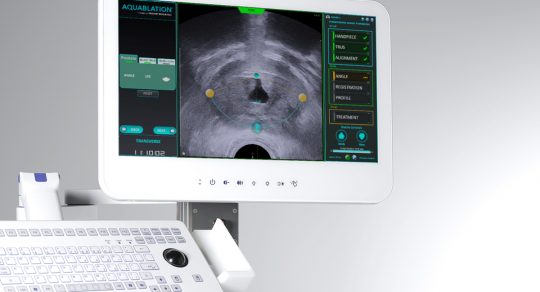Residency
Urology
The Urology Residency at Penn State Health Milton S. Hershey Medical Center is a five-year integrated program that admits three residents per year.
On This Page
The Urology Residency is intended to develop a superb urologist who has as their primary concern the health and well-being of the patient.

Program Overview
The program fosters lifelong learning skills, an appreciation for research and the ability to critically evaluate future medical and surgical therapies to enable the physician to incorporate valuable newly developed treatments into practice.
The program offers residents progressive responsibility over a large patient population in clinical and surgical settings, culminating in the resident demonstrating independent management of all urologic problems. The program provides the resident with the skills to excel as an independent urologic clinician.
Curriculum Details
Rotations are structured in a preceptorship model, allowing the resident to be in regular contact with one of the teaching staff urologists and exposed to one discipline of urology at a time.
This helps the learner to solidify their understanding of the “practice” of urology and hone their surgical skill set through repetition.
Each rotation is on average two months. Residents rotate multiple times on each of the various services throughout their five years.
Penn State College of Medicine and Penn State Health promote an environment of inquiry, and all residents are expected to participate in scholarly activity during their fellowship training.
Given the diverse interests of the faculty, the program has the ability to support scholarly interest in many areas, including basic science, clinical trials, outcomes research and medical education, and across all subspecialties of urology.
The Department of Urology benefits from robust research support, which includes two dedicated clinical research assistants and support for grants and IRB applications, industry-sponsored clinical trials, quality improvement initiatives, statistical analysis and observational research.
Residents are financially supported to travel and present research at regional and national meetings, and the program regularly has a robust showing of residents attending the Mid-Atlantic Section of the AUA and the AUA annual meetings, among others.
The educational curriculum in the Urology Residency is robust and well-rounded, providing didactic teaching across all disciplines of urology. The resident will be exposed to the entire curriculum twice throughout their residency allowing the learner ample time to garner the medical knowledge necessary to be a successful urologist.
Thursdays
6:30 to 8 a.m.
Every Thursday: Didactic Conference - based on monthly topic
Journal Club
Guest Speakers
Simulation Center
SASP Review
Every Thursday: Genitourinary Tumor Board (resident rotating on oncology service attends)
6:45 to 8 a.m.
Third Thursday (no Didactic Conference on this Thursday)
M&M Conference
Fridays
6:30 to 7:30 a.m.
Every Friday: Pre-operative Conference
Visiting Professor Programs
The Department of Urology hosts three to four visiting professor programs yearly, allowing faculty and all residents to engage with current leaders in the field and network for future employment and research opportunities.
Simulation Labs
At least quarterly we stage a simulation lab for a given skill or procedures. Examples include cadaver labs for prosthetics, injection technique of bulkamid, virtual trainers with the greenlight laser and urolift.
Wellness
Biannually there are lectures designed to target the overall wellness of the surgeon in future practice. Past examples include “Surgical Ergonomics”, “Dealing with Complications” and “Stress Reduction during Residency”.
Professional Development
At least twice per year, we have lectures designed to enhance the residents skillset in the medical profession outside of the clinical sphere. Past examples include “Emotional Intelligence in the Workplace”, “Urologic Side Hustles”, “Billing and Coding”, “Defining Success for Yourself”.
Program Leadership
Learn More about the Residency
Prerequisites
To begin the Urology Residency, applicants must be graduates of an approved medical school. Note that acceptance into the Urology Residency will automatically assure the applicant of a PGY-1 position in the General Surgery Residency; it is not necessary to apply separately to the surgery residency program. Applicants who are offered interviews, match into our residency program, and successfully complete the residency in urology, will be able to apply for admission to the certification process of the American Board of Urology. Please refer to the American Board of Urology website for additional information.
Application Process
All applications must be made through ERAS (Electronic Residency Application Service). After careful review of all applications, applicants will be invited for interviews. It is impossible to invite every applicant for interview; those applicants invited will be notified and asked to select one of several days set aside for individual interviews, tours of the facility and time to meet with current residents.
Match Process
In addition to applying via ERAS, applicants must also register through AUA for the American Urological Association (AUA) Residency Match for Urology. With questions about that match, write to AUA Residency Matching Program, 2425 W. Loop South, Suite 333, Houston, TX 77027-4207; call 713-622-2700, ext. 86, fax 713-622-2898; or email resmatch@auanet.org. The AUA assigns match numbers to applicants and programs and sends preference list forms to applicants and programs. Applicants and programs then send the completed forms to the AUA in January. The AUA performs the match and sends results to applicants, medical schools and urology training programs.
Visiting Sub-Intern Application Process
This program is participating in the standardization of invitations to medical students for away/visiting rotations through the Society of Academic Urologists. Please apply through VSOL, which opens Feb. 1, 2025, and your application will be reviewed.
Our program is flexible with rotation dates. Please email Danielle Shreiner at dshreiner@pennstatehealth.psu.edu if you need alternate dates that are not listed, and we will do our best to accommodate you.
For additional information please visit the .
The Urology Residency offers robust educational support to help our residents achieve success. This includes:
Textbook stipend
Purchase of surgical loupes
Tablet stipend
Attendance of AUA Fundamentals in Urology
Attendance of AUA Board Review Course
Financial support for travel to present research at regional and national meetings
Wellness Days
Residents are given 3 wellness days per year to attend to whatever needs they may have. These are scheduled in advance and used for doctors or dentist visits, attending their children’s school events, moving, car maintenance, etc.
Parental Leave
Penn State supports two weeks of parental leave. For more prolonged leave short term disability may be used to provide funding. In accordance with the ABU, residents are allowed to take 6 weeks of leave without affecting vacation or sick time and potentially an additional 2-4 weeks depending on their training year.
Mental Health
The Office for Professional Mental Health provides free, discrete counseling to any resident who needs it and we support our residents by providing them the ability to avail themselves of these services during the work day.
Resident Honors and Recognitions
Penn State College of Medicine and Penn State Health Milton S. Hershey Medical Center accept ongoing nominations for the Exceptional Moments in Teaching award.
The award, given monthly by the Office for a Respectful Learning Environment, accepts nominations from College of Medicine students who are invited to submit narratives about faculty members, residents, fellows, nurses or any other educators who challenge them and provide an exceptional learning experience. .
Previous nominees from the Urology Residency are listed here.
The annual Resident Research Day is held each year (with exception of during the COVID-19 pandemic) on and around the Penn State Health Milton S. Hershey Medical Center campus.
The intent of the event is to provide an opportunity for residents and fellows to showcase their research accomplishments to their peers in other clinical departments, as well as their colleagues in the basic sciences.
.
Previous presentations from the Urology Residency are listed here.
Supporting Your Training
Contact Us
Phone: 717-531-8848
Fax: 717-531-4475
Email: dshreiner@pennstatehealth.psu.edu
Mailing Address
Penn State Health Milton S. Hershey Medical Center
Department of Urology
500 University Dr., MC H055
Hershey, PA 17033-0850







